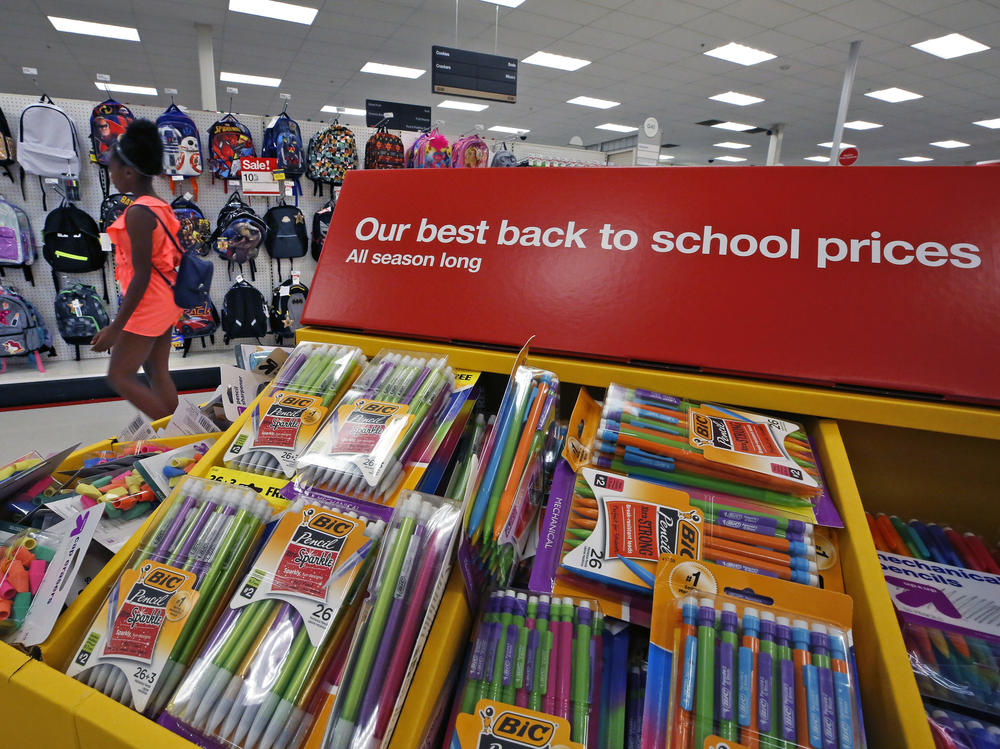Section Branding
Header Content
It's back-to-school shopping time, and everyone wants a bargain
Primary Content
Rainbow-colored masking tape. Clear storage bins. Dry-erase markers. Microfiber cleaning cloths. A bulk package of Crayola crayons.
These are some of the items on third-grade teacher Dana Stassen's Amazon wish list, which she uses to crowdsource supplies for her classroom in Kennesaw, Georgia. Even with help, she typically spends more than $1,000 on school supplies, classroom decorations and snacks, she says. But this year, she's trying to spend around $800, although she doesn't know whether that will be possible with inflation.
"I'm going to have a ton of out-of-pocket expenses as a classroom teacher to make sure that my students have what they need," Stassen said.
Many parents are also hoping to pull back on spending on school supplies this year, according to a survey released Wednesday by Deloitte. The firm is predicting that spending will decrease 10% from last year, marking the first decline since 2014, said Stephen Rogers, the managing director of Deloitte's Consumer Industry Center. Inflation is having a big impact on how parents are shopping, he said.
"So parents who say they're spending more and parents who say they're spending less, both blame inflation for that," Rogers said. "So that's also a curious place where we find ourselves. Inflation is definitely top of mind for everyone."
Nabbing a $3 shirt and looking for discounts
Prices for school supplies have jumped nearly 24% in the last two years, according to data from the Bureau of Labor Statistics. Due to the higher prices, many shoppers this year are focusing more on getting classroom supplies like folders and pencils than they are on new clothes or tech products, Rogers said.
Melissa Wright, a parent and former elementary school teacher in Chandler, Ariz., is back-to-school shopping this week before her kids' first day of school next Wednesday. She's aiming to spend under $250 on clothes and supplies for both of her kids.
"I use the Target Circle app, so today even for the shirts and stuff I bought my daughter, they were all like 30% off. One of them I looked at rang up like 3 bucks," said Wright. "I do love a sale."
She isn't alone. Most shoppers are planning back-to-school shopping around sales events, according to the National Retail Federation. Deloitte's survey found that 69% of shoppers will look at back-to-school deals on Amazon during its Prime Day event, which started Tuesday and ends Wednesday. But people prefer to shop in person for the majority of their back-to-school shopping.
Stassen, however, is relying more heavily on online shopping to prepare for her return to the classroom, as well as to get items for her first-grader and fourth-grader. She works as an assistant director at a Pennsylvania summer camp, and she won't be back home in Georgia until right before school starts on Aug. 1.
"Like many parents I know, we're all doing our school supply shopping online as best we can while we're away and just getting things shipped to the house," said Stassen.
To save money, she also plans to use teacher discounts where offered and visit secondhand stores to maximize her budget.
"I definitely try to keep my ear to the street for when those teacher discount days are happening, for my classroom and for my own kids," Stassen said.
Summer started less than a month ago, but already it's time to shop for school
The bulk of back-t0-school shopping will be over before July ends — even though some schools won't open until September. According to Deloitte, 59% of total back-to-school spending is expected to take place in July.
Despite financial concerns, some shoppers will still splurge on some items, Rogers said. Wright said she'll probably spend the most money on new shoes and backpacks for her kids. According to the Deloitte survey, parents are most likely to splurge on apparel and tech, with 6 in 10 parents saying they would spend more on higher-quality items or to "treat their child," an experience Rogers shared.
"It's something very familiar with me," he said. "I just spent more on my 13-year-old's first cellphone because she wanted a specific brand in purple."
Editor's note: Amazon is among NPR's financial supporters.
Copyright 2023 NPR. To see more, visit https://www.npr.org.

